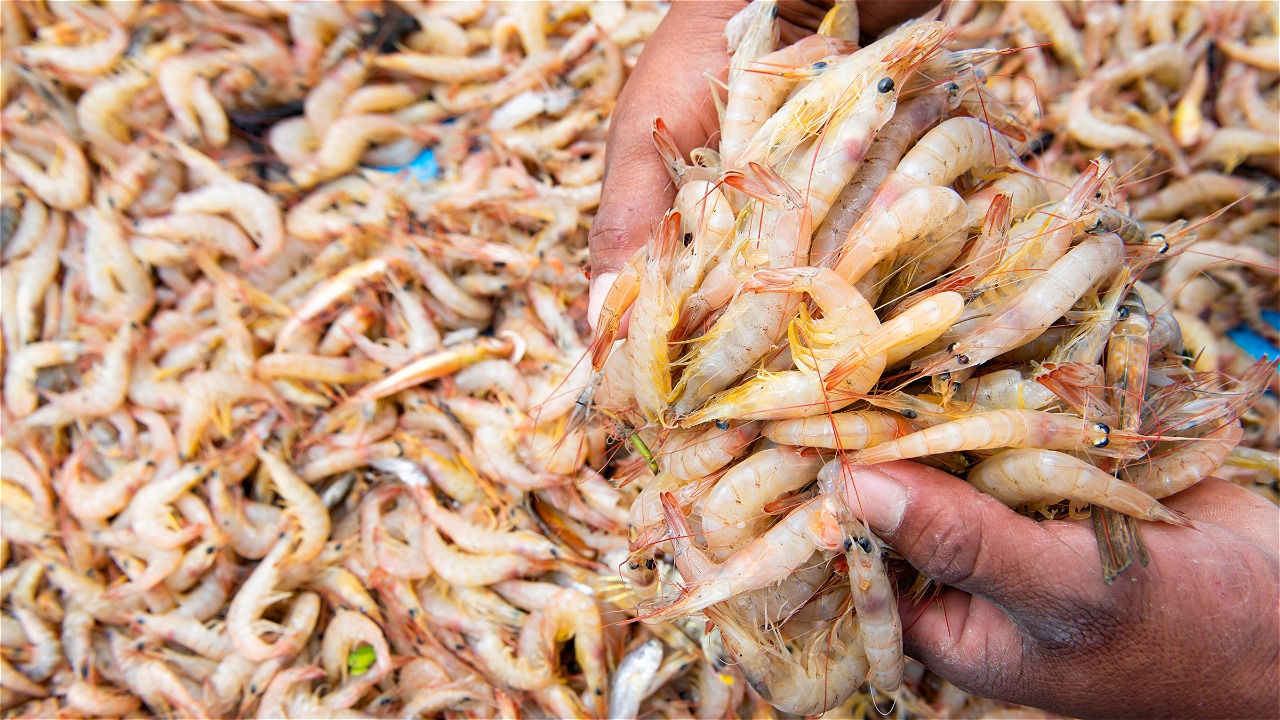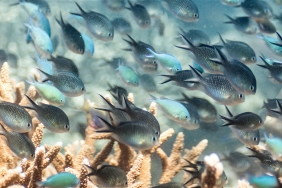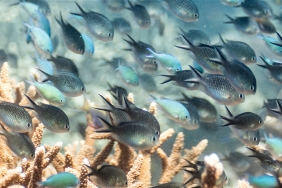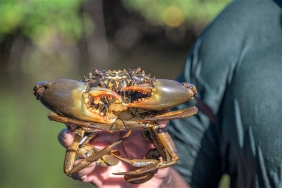PT.PANCA MITRA MULTI PERDANA OFFICIALLY JOINS SEAFOOD SAVERS
April 25, 2011
Jakarta, 25/04/11 - WWF, a global conservation organization, signed a Memorandum of Understanding with PT Panca Mitra Multi Perdana (PT PMMP), to join SEAFOOD SAVERS to work together to improve the fishing industry through more environmentally friendly fishing and processing practices.
SEAFOOD SAVERS is a corporate dialogue and collaboration group initiated by WWF-Indonesia since October 2009, which aims to strengthen support from the industry sector to improve marine fisheries management in Indonesia. The industrial sector is one of the parties that can most influence the improvement as well as the damage to the environment and the sustainability of natural resources. PT PMMP is a fisheries company with one of its commodities being wild-caught shrimp using trammel net gear or three-layer nets caught in the waters of Berau, East Kalimantan.
"PT PMMP is the third corporate partner to sign a Memorandum of Understanding under the SEAFOOD SAVERS umbrella. We invite more fisheries producers and retailers to join the SEAFOOD SAVERS initiative so that more parties can speak out for improved fisheries management in Indonesia," said Dr. Efransjah, CEO of WWF Indonesia in his remarks.
In contrast to trawling, fishing activities using trammel net, have minimal impact on marine habitats and have less bycatch. The use of trawls to catch shrimp has been banned in most parts of Indonesia since the issuance of Presidential Decree No. 39 of 1980 on the Elimination of Trawl Nets, also known as tiger trawls or helicopter trawls. Trawling destroys the composition of the seabed while catching non-target species at a ratio of 1:10 between shrimp and other marine animals. "WWF assesses that trawling is the most effective way to catch shrimp and other marine animals.
"WWF considers trammel net, which has a catch ratio of about 3:2 for target versus non-target species, is by far a better alternative to trawling", explains Abdullah Habibi, Capture Fisheries Coordinator of WWF-Indonesia's Fisheries Program. Another alternative is environmentally friendly aquaculture; not taking seeds from nature, not consuming mangrove land, and not using chemicals as pesticides or feed. In addition to encouraging certification for marine capture fisheries products through the MSC scheme, WWF also encourages responsible aquaculture practices according to the Aquaculture Stewardship Council (ASC) certification standards and compiles the Guidelines for Responsible Shrimp Aquaculture Practices. "The support of NGOs such as WWF-Indonesia is crucial for the development of responsible aquaculture practices.
"The support of NGOs like WWF really helps us face the market pressure that demands the availability of environmentally certified products. However, government support is the main thing we need to create more conducive fisheries conditions to achieve these environmentally friendly fisheries certification standards, "said Soesilo Soebardjo, Director of PT.Panca Mitra Multi Perdana.
The Memorandum of Understanding signed by both parties agreed on three recommendations to be fulfilled by PT. PMMP, namely; 1) conducting socialization on catch zones based on fisheries business licenses among fishermen, 2) establishing internal policies regarding traceability systems, especially to avoid purchasing shrimp products caught using environmentally unfriendly fishing gear, and 3) providing support to activities to identify seasons and spawning locations carried out by local governments and or other institutions (NGOs, universities, research bodies). For more information, please contact us.
- Margareth Meutia, Corporate Campaigner for Marine Program WWF-Indonesia, +628158812844, MMeutia@wwf.or.id
- Imam Musthofa Zainuddin, National Fisheries Program Coordinator WWF Indonesia, +628123853921, IMusthofa@wwf.or.id
***Note to the Editor:
About SEAFOOD SAVERS
Seafood Savers is an initiative by WWF-Indonesia to form a group of companies consisting of producers, exporters, importers and retailers engaged in the exploitation and trade of marine resources, as well as financial institutions that invest in marine resource businesses. Currently, 10 companies have expressed interest in joining SEAFOOD SAVERS. With support from WWF in Indonesia as well as regionally and internationally, this group will conduct campaigns that raise fisheries and marine issues and is expected to inspire more business practitioners to join and jointly promote sustainable fisheries practices for the preservation of marine ecosystems and resources. The signing of the MoU is the fourth stage where companies agree to WWF's recommendations to meet the minimum requirements of sustainable fisheries.
About WWF-Indonesia
WWF-Indonesa is a conservation organization that has a vision to preserve Indonesia's biodiversity for the welfare of present and future generations, with a main focus on the marine and fisheries sector which includes sustainable and responsible management and utilization of marine and coastal resources through efforts to protect and manage areas that are important for marine ecosystems and ecology, sustainable and responsible transformation of fisheries businesses, as well as protection and management of endangered and protected marine species. About WWF-Indonesa
About PT.Panca Mitra Multi Perdana
Based in Situbondo, East Java, PT Panca Mitra Multi Perdana (PT PMMP) is a seafood processing company that exports its products to a number of countries in Europe, including Switzerland, Germany, Denmark and Sweden. Together with WWF, PT PMMP holds a vision to become a leader in the seafood management business with a management pattern supported by human resources with high productivity and ability for company growth and benefits for consumers and employees in accordance with company values and regulations.
Together with WWF, PT PMMP targets to; 1) produce high quality and high value products according to consumer needs, also provide opportunities to develop the best workforce in line with company development, 2) encourage the creation of new employment opportunities and 3) care for community and environmental development.





